Piano man makes his stand
Rocketman doesn’t gloss over Elton John’s heap of personal and professional problems.

There was a time when musical biopics were all the rage. That was in the distant past when the (alleged) lives of some of the 20th century’s greatest songwriters were told on film — George Gershwin (Rhapsody in Blue), Richard Rodgers and Lorenz Hart (Words and Music), Jerome Kern (Till the Clouds Roll By), Bert Kalmar and Harry Ruby (Three Little Words) and Cole Porter (Night and Day) were all given the Hollywood treatment, which basically amounted to a sketchy story along formulaic lines — humble beginnings, early success, major setbacks, final triumphs — as an excuse to have a gallery of famous guest stars perform the songs themselves. The most notorious of these, Night and Day (1946), starred Cary Grant as Porter — who was gay — and contrived a totally false narrative about his lifelong love for a woman.
Times have changed, and last year’s megahit, Bohemian Rhapsody, didn’t make a saint of Freddie Mercury. Nor does the exhilarating Rocketmanpretend that Elton John hasn’t had a whole heap of personal and professional problems.
These are warts and all biopics, and all the better for it. That said, the fairly candid scenes of gay sex and drug taking featured in Rocketman are a little surprising given that John and his husband, David Furnish, were producers.
The film opens with something of a bang as, in a blaze of light, Elton (Taron Egerton), colourfully garbed in a red costume festooned with sequins and augmented by wings and a headpiece featuring horns, bursts into a drab room where a group of “ordinary” people are discussing their problems. This proves to be an AA-like meeting in a clinic, where John freely admits to his various addictions — to drugs, booze, sex and shopping, plus a problem with anger management. And then, as he starts to tell the group about his life, his story is told in flashback.
And it’s not so very different from the formula of those biopics of another era. Promising childhood, early success, love troubles, professional woes, eventual triumph. The various stages of the life of a superstar are ticked off one by one.
As a little boy, then known as Reggie Dwight (Matthew Illesley), he gets little love from his brusque father (Steven Mackintosh) or his flighty mother (a seriously miscast Bryce Dallas Howard) but is adored by his Gran (Gemma Jones), the only one really impressed by his skills at the piano keyboard. A scholarship to the Royal College of Music and a devotion to Elvis Presley — the adolescent Reggie (Kit Connor) sports the King’s hairstyle — lead eventually to his teaming with Bernie Taupin (Jamie Bell), a scruffy lyricist who provides the words for Reggie’s music. At this point Elton makes a conscious decision to change his persona from that of the shy suburban kid everyone picks on to that of an exotic, flamboyant creature. As a visiting American rocker advises him: “You got to kill the person you are to be the person you want to be.”
The lads find a sceptical agent, Dick James (Stephen Graham) and Reggie changes his name to Elton John (the “John” being a tribute to John Lennon). And so, in 1970 when Elton John is 23, he performs for the first time in America at the Troubadour Club in Los Angeles — the number is Crocodile Rock — and the rest is history. According to Lee Hall’s screenplay — officially sanctioned, presumably, by John and Furnish — Elton’s platonic relationship with Bernie was what sustained him during these early years, while his passionate sexual relationship with the shifty John Reid (Richard Madden) was a destructive one.
Of course, we all want to hear the songs, and they’re (mostly) sung by Egerton — interestingly, it’s Bernie who sings the plaintive Goodbye Yellow Brick Road when the friends part for a period. In the staging of the musical numbers, director Dexter Fletcher comes into his own. Fletcher, a former child actor, previously directed the wonderful but underrated Sunshine on Leith (2013), a poignant musical set in Edinburgh (I sing its praises in my book 101 Marvellous Movies You May Have Missed) and he really knows how to stage and choreograph the musical sequences. Check the way Saturday Night’s All Right involves intricate activity inside and outside a pub, or how the title song, filmed in a swimming pool, connects the mature Elton with his inner child. For Pinball Wizard, Fletcher has George Richmond’s camera swirl around and around the performer, while the very precise editing shows off Elton in a dazzling array of exotic costume changes.
Fletcher is one of the few directors working today who really knows how to stage this sort of lavish musical number for the camera (Baz Luhrmann is another) and it’s interesting to note that he took over the direction of Bohemian Rhapsody — without a screen credit — when the credited director, Bryan Singer, quit the production.
Lee Hall also scripted Billy Elliott (2000), a fictional film with a somewhat similar dramatic arc — and Billy was played by the young Bell. Bell is a standout here as Elton’s loyal friend and collaborator, while Egerton is perfectly cast as Elton and acquits himself very well in the performance of the familiar songs. The film’s climax — which, of course, is a celebration of Elton’s career — is a spirited version of I’m Still Standing, which is performed on the beach outside the Carlton Hotel in Cannes — just a block away from the Palais where Rocketman had its world premiere a couple of weeks ago. There was a standing ovation then, and it seems safe to say that audiences unfazed by Elton’s well-known excesses — both sexual and addictive — will have a very good time with this satisfyingly modern musical biography.
-
COMIC RELIEF FOR TWO GREATS OF GAUL

I can’t say I’ve followed the Asterix series very closely. Asterix: The Secret of the Magic Potion is the 14th film version featuring the cartoon characters created in 1959 by Rene Goscinny and Albert Uderzo. There have been 38 Asterix books, dating back to 1961, and 14 feature films to date, 10 animated and four live action. Magic Potion, directed by Alexandre Astier and Louis Clichy, is an original story not based on a book, and is computer animated.
Set in 50BC in the last village of Gaul not yet occupied by the Romans, the film is broadly comedic and seems very influenced by American animated films, though this perception may be coloured by the American dubbing of the version being released in Australia. The characters are broadly caricatured, the plotting is simple, and the slapstick jokes are of the Ice Age variety, though not quite as clever.
The narrative, such as it is, involves finding a replacement for the ageing Druid leader Getafix (he’s named Panoramix in the French version) and finding a young wizard capable of successfully manufacturing the eponymous magic potion that makes the locals strong enough to defeat the invading Roman army.
Devotees of the characters of diminutive Asterix and his hulking friend Obelix — and there are many — no doubt will celebrate that the latest film in the franchise is getting a cinema release, albeit a limited one, in this country.
Rocketman (M)
National release. 4 stars
Asterix: The Secret of the Magic Potion (Asterix: Le Secret de la potion magique) (PG)
Limited release. 3 stars




To join the conversation, please log in. Don't have an account? Register
Join the conversation, you are commenting as Logout